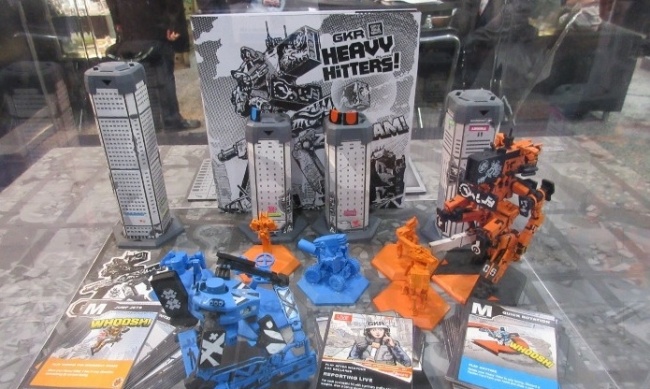In Part 2 of this two-part interview, we talk about the collaboration with Cryptozoic, the decision to use Kickstarter, the plan for trade release, and the future of the game after launch.
In Part 1, we talked about the origins, influences, and nature of the world of GKR.
How did you get connected with Cryptozoic to do the game design side of it?
Tobin: The connection via Mike Gonzales, who was our Head of Consumer Products at the time. He's an American guy. He comes from a Bungie [Inc.} background. He was incredibly well‑connected in the games industry and the U.S. He knows John at Cryptozoic.
He just reached out to John quite early on, as soon as we saw we needed to partner up with a company that knew what they were doing. We're not game designers. Actually, it seemed to come together pretty quickly.
The decision to launch with the Kickstarter, was that a Cryptozoic choice, or a mutual choice?
Tobin: That was something that we were very keen to do. We've never run a Kickstarter through Weta Workshop before. I've run my own Kickstarter for some of my own projects. I think it's an amazing way to be out and connect directly to your fans, also to directly test whether what you're making is good enough for the people that you're making it for. That's a really cool business model. As seen these days with the way that board games are developed, Kickstarter or crowdfunding for a board game now, it's part of the market.
It's such an established precedent now that I'm not even sure we would have even entertained not doing a Kickstarter. Yes, it's a lot of work and it's quite scary, but at the same time it's fun and exciting as well.
When is the game plan for release both through Kickstarter and then through retailers?
Tobin: February 22 is when we launch the Kickstarter. When do we schedule delivery time at this stage?
Sutton: [Tentatively] December 2017.
Will the trade release come immediately after the Kickstarter backers get theirs? What's the relationship between those two?
Sutton: We'll have a retail tier on the Kickstarter. Yeah, we're still ironing out where the exact retail release will be. I understand that it's best practice to fulfill all Kickstarter copies first, and then to give at least a month or so before distribution to retail outlets. We are just sort of nailing down that timing.
Tobin: We did a road trip with this game, in the States, visiting small game stores and getting their direct feedback and input by showing them directly.
I like game stores, I like comic book stores. I know the importance of getting those guys involved, and getting their support. We want to try to make this work for everyone, we just need to iron out those last few details.
How did the retailers, when you enlist at their shops, Leri, what was their response?
Greer: They definitely said...I guess Kickstarter can be considered the antithesis of game stores. They said the main thing was, make sure that there's that [retailer] tier for buying [multiple copies.] The other thing that they were saying was, "Please, please, please make sure if you can get us demo copies, so it's not a hard sell.” Make sure that it's not a lot of SKUs.
They sent us all kinds of feedback.
Tobin: That feedback around four players, originally the game was actually just going to be a two‑player game. That feedback that we got from that road trip was how much cooler it would be if we could somehow manage to get it up to four players.
We went back to the drawing board on that, and listened to what the fans were saying, and we've just now put together a four‑player game. It means that now it's a huge box full of stuff.
Which is a cool thing, but it's going to be quite a big box.
Do you have any plans for expansions at this point, like adding players, or adding different mechs?
Greer: Yes, for sure, there are definitely expansions. The way that the game is set up right now is that the robots are separated into corporate factions. Right now, we have four corporate factions that are going out at release, but we have four more planned, as well.
We've got this idea, that the game play doesn't become stale in the sense that once you've learned a robot you've learned its functionality and you know how it plays out every time; we have pilots and pilot modifier cards.
What we're trying to do is put two more pilots in for every time. If there's four factions, there's six pilots, and they each modify in different ways. There's expansions that way, so just more factions, more robots, and then more pilots with different abilities.
We've talked a little bit about having some fun cross‑play type things, because the way the game is set up right now is just a big robot rumble. It's really, really fun, but because it is immediate in the “in world,” it's a sporting event that gets covered for live television presentation.
We've also thought that you could have really fun cross game play, where say, two people are playing, fighting as the robots, but the two people sitting on either side of them are actually playing as the press or the TV coverage people who are trying to get the best TV footage without getting destroyed by missiles. So there's lots of expansion ideas, but right now we're just mainly focused on getting the core product ironed out.
Tobin: I'm a big fan of tournament play, and I think it was always the dream that if we could get this game successful enough, and enough people wanted it, that we could easily expand it into tournament play. Christian, how many more factions have you got in you?
Pearce: The fun of semantics for me is coming up with those different robots. We've tried to make them all recognizable, having defined silhouettes and defined shape language within each robot, which also trickles down to the support droid.
We've already started sketching up ideas for this next group of robots, and it feels like we've got a long way to go on these.
Tobin: That, for us, is one of the most exciting things about this whole journey, is that we're going to hopefully be able to continue going with it. Ultimately, that's going to be decided by the board game fans. If they like it, we'll definitely love to keep doing more of it. I guess it's just fingers crossed, and hope that they like what we've made.
Anything else that you want to communicate to our retailer readers?
Greer: When I was going around to stores, the main thing that we want people to experience with this game is “fun.” In a way, it's an interesting game, in the sense that you might look at it and think it's a minis game, but it's actually a board game that happens to have minis.
The thing we were trying to say is, it's almost like the game you get together with your minis buddies, and you play when you only have a little amount of time.
Sutton: Rather than having a whole day to play with a minis game.
Tobin: A whole day to play your mech games where you get out your rulers and the tape measures. That's fun, but it's almost like the game that you're playing with a couple guys while you're waiting for everybody else to show up. It's fun.
The other thing we noticed when we were play testing in all the game shops that we went to, and then at Gen Con, was just the aspect of how fun it is, and when you were playing with friends, that when you're tramping them.
We have a lot of cards that you can lay down that counter other cards. This gets to be this fun thing where you just really get to screw your friends over, but in a fun way.
Pearce: Another aspect that we really think is going to have a wider appeal is just for non‑gamers. You're going to get this box with four super-cool robots, and its support droids as well, but like Paul has been saying, we haven”t made a board game before, but we've designed and built robots.
We've made a lot of collectibles before, and I think these positively stand alone as something that you'd want to own, and have on your desk. I'm sure they're going to be buying a couple sets of it, do custom paint jobs, and just have it out on display the whole time. They are really looking like what we hoped they would.
Do you have any special plans for retail release after the Kickstarter?
Tobin: I come from a retail background. I used to work in shops like that, and I know how important it is to try to give retail owners something special that they can give to their favorite customers, something that you can't just get at the big Target stores or whatever.
I've already started having some early discussions around how we might be able to offer retailers that purchase, say, certain amounts off us, some special versions of the game. Or just something that is a little bit exclusive and special.
Greer: To that point, if we find that the game is received well enough, then at that point moving into organized play. That's just working with Cryptozoic to make sure that as far as organized play goes, that the tournaments have good prizes.
Click here to go back to Part 1.




